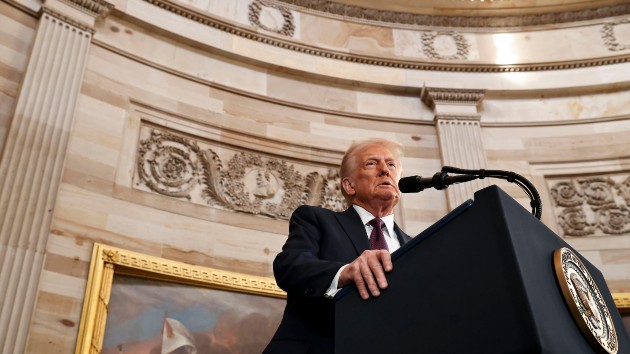
(WASHINGTON) — On the first day of his second term, President Donald Trump announced some energy and environmental policy priorities that represent a stark departure from U.S. climate policy under former President Joe Biden.
His professed policies include a declaration of a “national energy emergency,” a rollback of the previous administration’s vehicle emissions standards — which were released last March — and the U.S. withdrawal from the Paris Agreement, which is a major international agreement intended to reduce the impacts of global warming.
On energy
Trump said during his second inaugural address Monday afternoon that he will declare a “national energy emergency” during his first day in office and “drill, baby, drill.”
“We have the largest amount of oil and gas of any country on Earth, and we are going to use it,” Trump said. “We will bring prices down, fill our strategic reserves up again right to the top and export American energy all over the world. We will be a rich nation again, and it is that liquid gold under our feet that will help to do it.”
The U.S. became a net energy exporter in 2019, during Trump’s first term — a status maintained under the Biden administration. In 2024, the U.S. reached an annual record of 13.2 million barrels per day of crude oil production, according to the Energy Information Administration. Last week, the EIA forecast additional growth for U.S. crude oil production this year in its most recent short-term energy outlook.
America is also already the world’s largest exporter of liquified natural gas, according to the EIA. The Biden administration paused the approval of additional LNG export facilities last January, with several project proposals awaiting approvals at that time. Ahead of the inauguration, the Trump administration said that it intended to undo this pause and expand LNG exports further.
On EV standards
Trump also said Monday that he would “end the Green New Deal” and “revoke the electric vehicle mandate,” in a statement that references Biden-era rules from the Environmental Protection Agency regulating tailpipe emissions from both standard and heavy-duty vehicles.
“With my actions today, we will end the Green New Deal, and we will revoke the electric vehicle mandate, saving our auto industry and keeping my sacred pledge to our great American autoworkers,” Trump said. “In other words, you’ll be able to buy the car of your choice.”
Trump’s comments misrepresent the Biden-era rules, which were not a mandate for automakers to manufacture electric vehicles and did not require Americans to buy any specific type of car. The standards, released in March 2024, established an average of allowed emissions across a vehicle manufacturer’s entire fleet of offered vehicles. They affected only newly manufactured cars from model years 2027 to 2032.
At the time, Biden administration officials emphasized that there were multiple pathways to compliance with the new tailpipe standards, including the use of improved internal combustion engines, hybrids and fully electric cars.
On the Paris climate accords
In a press release, Trump also said he would withdraw from the Paris Agreement on Day 1 — a move that would make good on one of his campaign’s promises.
The Paris Agreement was originally ratified at the annual United Nations Climate Conference (also known as the Conference of the Parties, or COP) in 2015. It intended to limit global warming to 1.5 degrees Celsius, compared to pre-industrial levels — a metric scientists believed would significantly reduce the impacts of climate change.
The world exceeded this metric for the first time in 2024, which was the warmest year on record according to the Copernicus Climate Change Service.
During his first term in office, Trump withdrew from the agreement; however, Biden re-entered it on his first day in office. The Biden administration implemented a slate of policies meant to address the country’s contribution to climate change and help mitigate emissions.
Both priorities are widely expected to change under the new Trump administration.
With another withdrawal, it seems Trump renders moot the Nationally Determined Contribution released by the Biden administration last month. That NDC, required by the Paris Agreement to be updated every five years, claimed the U.S. was setting a goal to cut its greenhouse gas emissions more than 60% by the year 2035.
Copyright © 2025, ABC Audio. All rights reserved.
